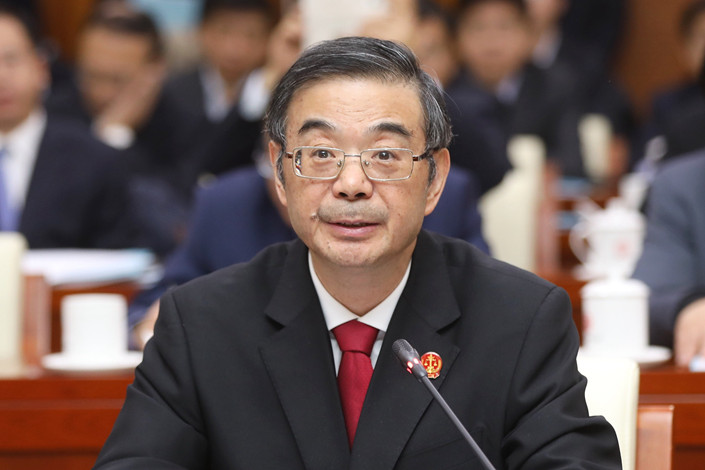China’s Top Judge Highlights Rights of Private Firms for 2019

* Zhou said China would bolster protections of property rights and protect the legal rights of all market participants
* Chief justice’s words signal the country’s leadership is taking the private sector’s complaints about inadequacies in the legal system more seriously
(Beijing) — China’s chief justice has highlighted the rights of private businesses in his annual work report to the nation’s top legislature for the first time, signaling increased emphasis this year on legal protections for entrepreneurs.
Zhou Qiang, who is also president of the Supreme People’s Court of China, delivered this year’s report to the National People’s Congress Tuesday morning, as part of the ongoing “Two Sessions” meetings of China’s top legislators and political advisors.
Zhou said that in 2019 China would intensify protections of property rights and protect the legal rights and interests of all categories of market participants. The legitimate rights and interests of private enterprises and entrepreneurs should be accorded equal protection under the law, Zhou added.
This marks the third year in a row that the Supreme Court’s work report, which sets the direction of the court’s work for the year ahead, has mentioned the protection of property rights. But this is the first time that private businesses have been specifically pointed out in relation to these rights.
In his report, Zhou said that courts should protect fair competition, be cautious when using “compulsory measures,” and refrain from seizing or freezing assets outside the scope of legal cases. The court should resolutely avoid treating civil liabilities in economic disputes as crimes, in order to allow entrepreneurs to focus on business and reassure them in their investments and operations, Zhou said.
This year’s report comes amid anxiety within China’s private sector that the country’s legal system doesn’t adequately protect them.
In May, Zhang Wenzhong, the founder of major supermarket chain Wumart Stores Inc., was exonerated after serving around a decade in prison for alleged bribery and fraud.
On Tuesday, Zhou mentioned the retrial and exoneration of Zhang as part of the justice system’s efforts to rectify misjudged cases involving property rights.
China’s judiciary will work harder to form a long-term mechanism to prevent miscarriages of justice, Supreme People’s Court Vice President Jiang Bixin told Caixin at a press event Tuesday.
Jiang said the judiciary will also work to refine the distinction between criminal acts involving enterprises — like contract fraud and embezzlement — and civil disputes. Also, the Supreme People’s Court plans to release more explanatory documents and case studies to improve judges’ understanding of these distinctions, Jiang added.
Contact reporter Teng Jing Xuan (jingxuanteng@caixin.com)

- 1Cover Story: China Carves Out a Narrow Path for Offshore Asset Tokenization
- 2Drownings Shake Chinese Enthusiasm for Travel to Russia
- 3China Business Uncovered Podcast: A $15 Billion Bitcoin Seizure and the Fall of a Cybercrime Kingpin
- 4Over Half of China’s Provinces Cut Revenue Targets
- 5In Depth: Inside the U.K.’s China-Linked Shell Company Factory
- 1Power To The People: Pintec Serves A Booming Consumer Class
- 2Largest hotel group in Europe accepts UnionPay
- 3UnionPay mobile QuickPass debuts in Hong Kong
- 4UnionPay International launches premium catering privilege U Dining Collection
- 5UnionPay International’s U Plan has covered over 1600 stores overseas



